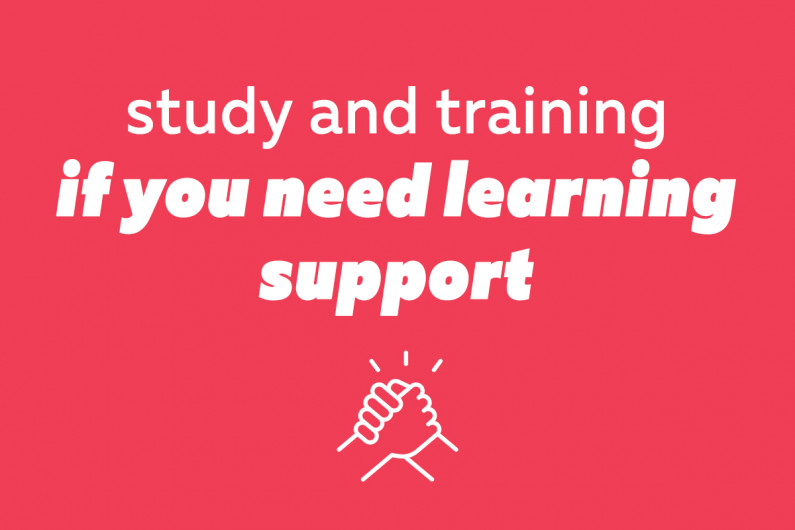Study and training if you need learning support

What support is available if you're disabled, neurodivergent, or otherwise need tertiary learning support.
What's on this page?
If you’re a learner who is disabled, neurodivergent, or needs extra learning support for any reason, there are plenty of options to help you succeed in your tertiary education goals.
A wide range of support is usually available for your study or training, and you can use this right through your programme or course.
Alternate formats for this page
Large print
Sound
Easy Read
New Zealand Sign Language video version of this page
Study and training if you need learning support in NZSL – 4.14 mins.
If you’re a learner who is disabled, neurodiverse or needs extra learning support for any reason, there are plenty of options to help you succeed in your tertiary education goals.
A wide range of support is usually available for your study or training, and you can use this right through your programme or course.
Plan the transition with your school
If you’re a school student with extra learning needs, by the time you turn 14 your school should be helping you make a plan for when you transition into adult life.
Choose an education provider
If you want to do tertiary study or training, choose an education provider that understands and supports your learning needs.
Most providers employ staff to support students who have:
- sensory or physical impairments
- barriers to learning and participating in their studies
- mental health conditions
- medical conditions
- temporary injuries or impairments.
These support services might include:
- advice and strategies for your learning
- low-cost or free accessible software
- spaces for study and meetings
- help with accessing the campus and parking
- sign language interpreters
- note-taking assistants
- printed material reformatting
- tutorials
- loan of equipment for learning and presentations
- library, laboratory and field work assistants
- alternative examination and term test arrangements.
Once you enrol, contact the student support team about what you need so they can arrange your support from the day you start.
QUOTE I put my heart and soul into my assignments and received good marks. I now know I have good ideas and my voice and opinions are worth something
Work-based learning
Your learning support needs or impairment shouldn’t be a barrier to an apprenticeship, traineeship or other opportunity to learn on the job.
Many disabled and neurodiverse people work in the trades and throughout different industries. Aotearoa has deaf people working as builders and truck drivers, dyslexic chefs and hairdressers, and farmers using motorised, all-terrain wheel bikes.
If you’re concerned about possible barriers to your apprenticeship or industry training, discuss them with your training provider and employer. The more they know about you, the more they can support you.
Plan the transition with your school
If you’re a school student with extra learning needs, by the time you turn 14 your school should be helping you make a plan for when you transition into adult life.
Choose an education provider
If you want to do tertiary study or training, choose an education provider that understands and supports your learning needs.
Most providers employ staff to support students who have:
- sensory or physical impairments
- barriers to learning and participating in their studies
- mental health conditions
- medical conditions
- temporary injuries or impairments.
These support services might include:
- advice and strategies for your learning
- low-cost or free accessible software
- spaces for study and meetings
- help with accessing the campus and parking
- sign language interpreters
- note-taking assistants
- printed material reformatting
- tutorials
- loan of equipment for learning and presentations
- library, laboratory and field work assistants
- alternative examination and term test arrangements.
Once you enrol, contact the student support team about what you need so they can arrange your support from the day you start.
I put my heart and soul into my assignments and received good marks. I now know I have good ideas and my voice and opinions are worth something
Advice for young Deaf people considering tertiary study from four Deaf graduates – NZSL.
Chapter 3 (starts at 3.10 mins) Deaf graduates Zoe, Meghan, Cory and Cha'nel share their advice for tertiary institutions and young Deaf people considering tertiary study – 5.13 minutes. Video: Deaf Aotearoa
Work-based learning
Your learning support needs or impairment shouldn’t be a barrier to an apprenticeship, traineeship or other opportunity to learn on the job.
Many disabled or neurodivergent people work in the trades and throughout different industries. Aotearoa has deaf people working as builders and truck drivers, dyslexic chefs and hairdressers, and farmers using motorised, all-terrain wheel bikes.
If you’re concerned about possible barriers to your apprenticeship or industry training, discuss them with your training provider and employer. The more they know about you, the more they can support you.
Updated 7 Feb 2024